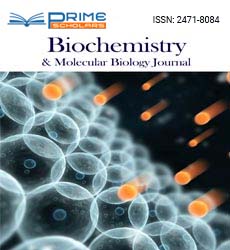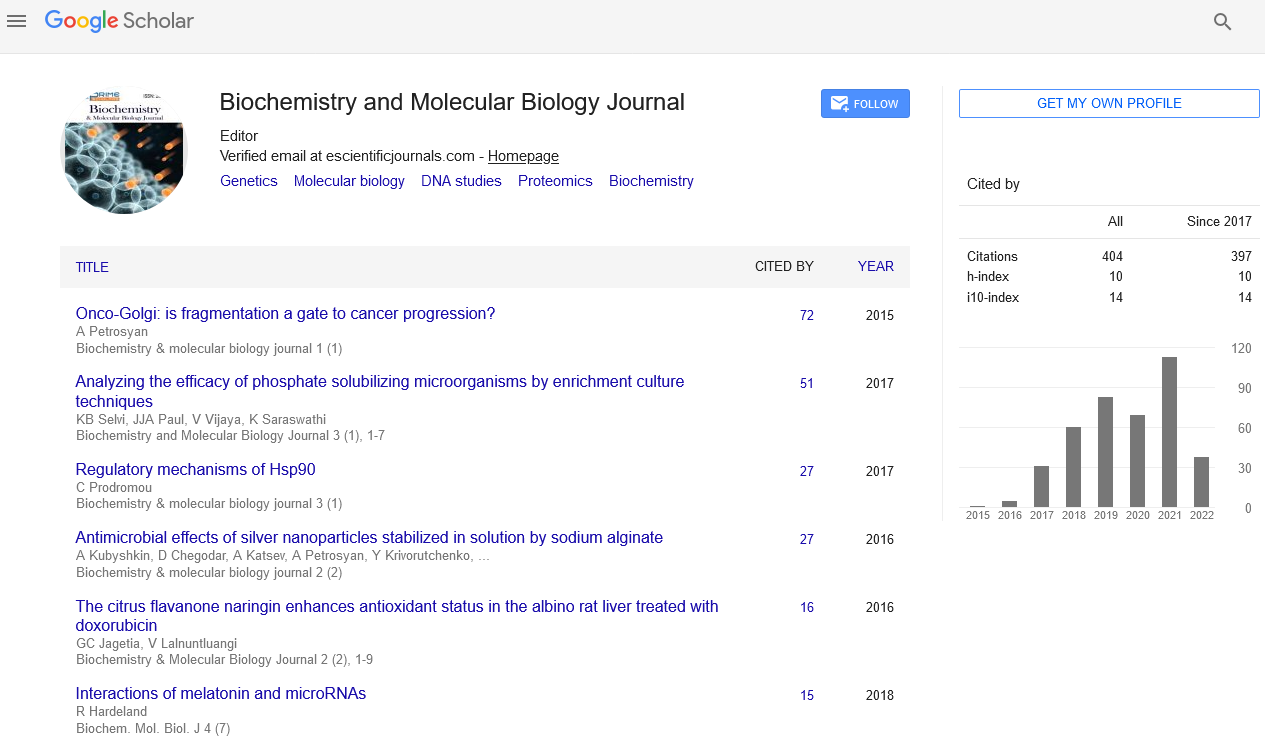Opinion - (2022) Volume 8, Issue 4
Understanding the Meaning of Molecular Pharmacology and its Role in Pharmacy or Clinical Care
Zongwei Cai*
Department of Environmental and Biological Analysis, Hong Kong Baptist University, China
*Correspondence:
Zongwei Cai, Department of Environmental and Biological Analysis, Hong Kong Baptist University,
China,
Email:
Received: 30-Mar-2022, Manuscript No. IPBMBJ-22-13342;
Editor assigned: 01-Apr-2022, Pre QC No. IPBMBJ-22-13342 (PQ);
Reviewed: 15-Apr-2022, QC No. IPBMBJ-22-13342;
Revised: 22-Apr-2022, Manuscript No. IPBMBJ-22-13342 (R);
Published:
29-Apr-2022, DOI: 10.36648/ 2471-8084- 22.8.66
Introduction
The curriculum focuses on the scientific investigation of drug
biochemical and biophysical properties at the molecular level,
as well as biopolymer interactions and impacts on cell structures
and activities. Includes molecular biology and biophysics
classes. Signal transduction, transmitters, and protein synthesis
and release pharmacology. Drug discovery and recognition,
molecular toxicology, drug design, pharmacodynamics, developmental
genetics, and treatment methods are all topics
covered in this course. Biochemistry, cell biology, physiology,
chemical biology, and biomedicine are all topics of study in molecular
pharmacology. The emphasis is on the drug’s impact on
the target molecule. It can be paired with system pharmacology
studies, which look at a drug’s positive or negative effects
on the body’s systems, or toxicology studies, which look at the
hazardous effects of medications and other chemicals on the
body. Although most people study molecular pharmacology at
the PhD level, there are bachelor’s and master’s degree programmes
in related fields.
About the Study
Pharmacology is the branch of medicine or biology concerned
with a drug or its impact, where the drug is any manufactured,
natural, or endogenous (body) substance, including biochemical
or physiological. A molecule can be characterised. Cells,
tissues, organs, and organisms take actions (the term drug may
be used to include these endogenous and extrinsic bioactive
species). It is the study of interactions between organisms and
chemicals that alter normal or aberrant biochemical function.
Therapeutic products are defined as substances that have medicinal
characteristics.
The study of pharmacology is essential for the discovery of new medications and therapies for human disease. Any chemical
that impacts biological processes can be classified as a medication.
Plant extracts such as morphine from the opium poppy,
quinine from the bark of the cinchona tree, and digitalis
from Foxglove were explored by early pharmacologists. Later
in the nineteenth century, pharmacology emerged as a biological
science that used scientific research ideas to therapeutic
situations. Today, the University of Arizona’s Molelcular and
Biochemical Pharmacology group uses biochemistry, molecular
biology, structural biology, cell biology, and cell physiology
to define drug action mechanisms and how drugs affect the
organism through studies on intact animals, organs, cells, subcellular
compartments, and tissues.
Drug discovery bottlenecks are mainly studies of the mechanism
of action of compounds found during drug target identification
and phenotypic screening. Another major issue in natural
product drug development is the scarcity of molecules for
property research, especially when the structure is complicated.
Timely chemical synthesis should be eliminated. In our lab,
we use genome and proteome profiling techniques that only
require tiny amounts of natural products to provide insights
about how chemicals work worldwide at the molecular and
cellular levels. Transfer genome-wide studies used to predict
bioactive chemical sites in yeast to more relevant mammalian
systems and study more sophisticated signalling networks.
Conclusion
Signals are identified via chemogenomic profiling in yeast and
RNAi-based drug susceptibility screening in mammalian cells.
Pharmacology, a life science , is involved within the study, discovery,
and characterization of chemicals that exhibit biological
effects, and therefore the elucidation of cellular and biological
functions related to those chemicals. In contrast, pharmacies, as specialists in medical services, have an interest in applying
the principles learned from pharmacology to their clinical environment.
In both areas, the most difference between the 2 is the difference in science-oriented research areas driven by
direct patient care, pharmaceutical operations, and pharmacology.
Citation: Zongwei C. (2022) Understanding the Meaning of Molecular Pharmacology and its Role in Pharmacy or Clinical Care.
Biochem Mol Biol J. 8:66.
Copyright: © Zongwei C. This is an open-access article distributed under the terms of the Creative Commons Attribution License,
which permits unrestricted use, distribution, and reproduction in any medium, provided the original author and source are
credited.

